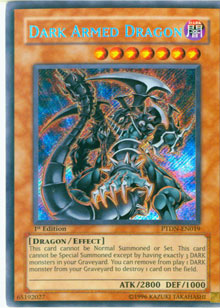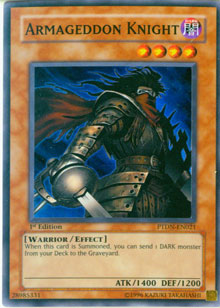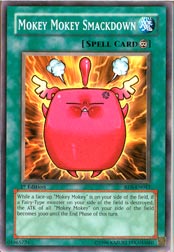Last week I went over a few ways that players deceive themselves while playing this game. Often, self-deception leads to unwanted consequences. Other times we make mistakes based on imperfect information supplied by our opponents. There are some crafty players out there who are skilled at deceiving you with mixed signals, feigned ignorance, and disruptive tactics. Some mind games are subtler than others, so it’s good to know the reasons behind why some of these tricks work and how not to fall prey to them.
Impatience
In my opinion, our tendency toward impatience is the most common contributor to obvious and critical mistakes. We give more weight to the present than the future. We prefer an immediate reward to a delayed but potentially larger one. If players can gain two extra cards over their opponent on turn 2  instead of waiting until it really matters, they tend to take the immediate gain. One possible explanation for this is that outcomes occurring in the future are thought of as less certain.
instead of waiting until it really matters, they tend to take the immediate gain. One possible explanation for this is that outcomes occurring in the future are thought of as less certain.
A common mistake of novice players is favoring immediate life point damage when it’s not wise to make an attack. For example, if you play Heavy Storm, Monster Reborn, and your Dark Armed Dragon in order to hit for 4000 points of damage or more while leaving you vulnerable to counter attack, that’s a mistake. You could be setting yourself up to get your field cleared, and you’ll lose whatever advantages you’ve gained. Making a big commitment to the field too quickly is the most basic recipe for disaster.
Since impatience leads to frustration, a devious opponent could intentionally play slowly: not too long to get a judge called in, but enough to force you to rush with faster play. While your moves may be quickly executed and deliberate, your opponent can pretend to play slowly and take the maximum allowed time to "think" about his or her plays before committing to them. I know how frustrating this can be. Can you remember the last time you dueled a slow player and wanted to just get up from your chair and scream? When you make your plays and find yourself facing an opponent who is obviously trying to get you angry, pay attention to the facts. Observe what the field looks like. Focus on your opponent’s plays and the information he or she gives away. If you feel like you need to make a big play, consider both the short- and long-term consequences of your decision. What if you’re wrong? What would it cost you? Can you recover?
Omission
Have you ever made a play that was clearly bad, yet had no idea why you did it? It happens all the time. I like to call them "crimes of omission." Sometimes we make that big push for damage knowing without a doubt that Mirror Force is face down. In the past, I’ve attacked targets that didn’t need to be attacked, simply to deal minor damage when the original goal was to get rid of the larger threat. It’s like using your D.D. Assailant to get rid of your opponent’s Armageddon Knight when the right play is get rid of Jinzo. You had Mirror Force face down but you decided to hit the Armageddon Knight because you could. You figured, "Well, I can get away with this because my opponent has to use Jinzo to attack my Assailant." You don’t take into account the other monsters in your opponent’s deck that can  take your monster down with relative ease. If that happens, you’re stuck with a useless Mirror Force.
take your monster down with relative ease. If that happens, you’re stuck with a useless Mirror Force.
We tend to focus only on present information rather than what may be missing. In other words, we base what is likely to happen on what we see, not on what we don’t see. The most basic example of paying attention to what is missing is looking through the graveyard to find Mirror Force and Torrential Tribute before making a move for the win.
Let’s observe a sample scenario:
What if your opponent is down and out and all he or she has is one face-down spell or trap, and a lowly Armageddon Knight on the field. You’ve been countering his or her every move all game. The opponent has two Darks in the graveyard (Dark Magician of Chaos and Jinzo) along with his or her mass removal.
Your opponent has 5500 life points and all you can do is hit the Knight. You have 8000 life points. Your opponent has two cards in hand. Let’s assume you can deal 4500 damage this turn and that’s it. Consider what is missing here. Has your opponent played Return from the Different Dimension? What are the odds of him or her having Dark Armed Dragon in hand? What if that Dark you send to the graveyard costs you the game? All it takes is dropping Dark Armed next turn, removing all three Darks, and flipping over Return to hit you for 8000+ damage.
Is it worth it to attack now and risk losing it all next turn? Or is it wiser to wait a turn and figure out another way to deal the finishing blow to your opponent? Maybe it doesn’t matter, because his or her next card could be Armageddon Knight number two? What is the probability of that occurring? Failing to consider your opponent’s hand and the cards that have not been played can lead to trouble.
Reciprocation
We tend to repay in kind what others have done for us—good or bad. We reciprocate unfair behavior even if it costs us. This happens a lot in the Yu-Gi-Oh! TCG. What if your opponent gets a good hand that allows him or her to draw six cards in one turn and set up a killer field? You look at your hand and all you can do is play one or two cards and pass the turn. You may end up losing in the next two turns and you’ll feel pretty sore about it. You want to get the opponent back for being so lucky and "unfair" to you. Naturally, you get  impatient. You may end up drawing a good hand like your opponent did last game, but instead, you play it fast and recklessly. You want your opponent to really see that you’ve got a great hand. "Look at me! Look how many cards I can draw!" The next thing you know, your opponent has outplayed you.
impatient. You may end up drawing a good hand like your opponent did last game, but instead, you play it fast and recklessly. You want your opponent to really see that you’ve got a great hand. "Look at me! Look how many cards I can draw!" The next thing you know, your opponent has outplayed you.
Is seeking "revenge" the best policy in playing a solid game? Not really. When you mix reciprocation with impatience, you tend to become irrational. Then you begin to omit certain information on your opponent’s field and make mistakes. When you mix these tendencies together, you get amazingly foolish behavior and faulty decision-making. Your games will fly by as if in a blur and they’ll end faster than you can keep track of. Once you become impatient and reckless, your tournament day is pretty much over. It’ll lead to all kinds of strange losses and instances of perceived luck that you can’t seem to explain. Sometimes it’s not that your opponent got lucky, but that you stopped paying attention to the game and cared more about how frustrated you felt.
Keep these points in mind and watch for my next article after the Light of Destruction previews. I’ll be talking about how recent losses can adversely affect your judgment and how your memory can be very selective. Thanks for reading and have a wonderful week!
—Bryan Camareno